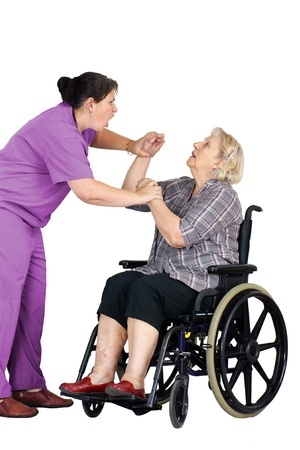How to Recognize Elder Abuse and What to Do?
June 26, 2017 | Category: Nursing Home Neglect/Abuse | Share“Elder abuse happens all too often. During Elder Abuse Month, June 2017, we would like to remind everyone about the signs of elder abuse and what can be done about it,” said Randall Spivey, Florida Nursing Home Negligence Attorney.
 Elder abuse can take many forms, according to HelpGuide.org, from physical battery, emotional bullying, psychological coercion, sexual abuse or neglect. Over half a million reports of abuse of the elderly in America are made to authorities every year. These are only the reported instances; it is believed there are many which are never reported.
Elder abuse can take many forms, according to HelpGuide.org, from physical battery, emotional bullying, psychological coercion, sexual abuse or neglect. Over half a million reports of abuse of the elderly in America are made to authorities every year. These are only the reported instances; it is believed there are many which are never reported.
Where does elder abuse take place?
Elder abuse takes place wherever elders live. The abuse happens in institutional settings and long-term care facilities as well as in their homes or the homes of their relatives.
The different types of elder abuse
Generally accepted definitions from the National Committee for the Prevention of Elder Abuse are:
- Physical Abuse: The use of physical force causing pain or injury.
- Sexual Abuse: Non-consensual sexual contact of any kind.
- Psychological/Emotional Abuse: The infliction of mental or emotional anguish or pain through verbal or non-verbal acts.
- Neglect: The refusal or failure of an individual to fulfill any part of his or her duties or obligations to an older person, including failing to provide an older person with necessities such as food, shelter, personal safety, clothing, medicine, and needed care. Neglect may also include the failure of a person who has financial responsibilities to provide care, such as paying for needed home-care services.
- Financial/Material Exploitation: The act of an individual illegally or improperly uses an older person’s resources, including property, funds, and/or other assets.
What are the warning signs of elder abuse?
The American Psychological Association (APA) says that the appearance of any of the following symptoms should prompt further investigation:
Physical abuse
- Bruises or grip marks around the arms or neck
- Rope marks or welts on the wrists and/or ankles
- Repeated unexplained injuries
Verbal/emotional/psychological abuse
- Uncommunicative and unresponsive
- Unreasonably fearful or suspicious
- Evasive or isolated
- Unexplained or uncharacteristic changes in behavior
Sexual abuse
- Unexplained vaginal or anal bleeding
- Torn or bloody underwear
- Bruised breasts or buttocks
- Venereal diseases or vaginal infections
Financial abuse or exploitation
- Large withdrawals from bank accounts, accounts that have been switched; unusual ATM activity
- Signatures on checks don't match the older person's signature
Caregiver neglect
- Lack of basic hygiene, adequate food and water, or clean and appropriate clothing
- Sunken eyes or loss of weight
- Person with dementia left unsupervised
- Untreated pressure bedsores
- Lack of medical aids (glasses, walker, teeth, hearing aid, medications)
Who has the legal responsibility to report elder abuse?
Section 415.1034(1), of Florida statutes, states that any person, including, but not limited to any state, county, or municipal criminal justice employee or law enforcement officer, who knows, or has reasonable cause to suspect, that a vulnerable adult has been or is being abused, neglected, or exploited shall immediately report such knowledge or suspicion to the central abuse hotline on the toll-free telephone number, 1-800-96-ABUSE (1-800-962-2873).
An act of abuse, neglect or exploitation of an older person might give rise to one or all of the following proceedings:
1) an investigation and finding by an adult protective services agency,
2) a civil cause of action for damages (a lawsuit), and/or
3) a criminal prosecution.
“We have seen the devastation caused by elder abuse, and our experienced legal team has handled many elder abuse cases. Contact Spivey Law Firm, Personal Injury Attorneys, P.A. There are no costs or attorney fees unless we make a monetary recovery for you,” said Attorney Spivey.
Florida Nursing Home Negligence Attorney,Randall L. Spivey is a Board Certified Civil Trial Attorney – the highest recognition for competence bestowed by the Florida Bar and a distinction earned by just one (1%)percent of Florida attorneys. He has handled over 2,000 personal injury and wrongful death cases throughout Florida. For a free and confidential consultation to discuss your legal rights, contact the Spivey Law Firm, Personal Injury Attorneys, P.A., in Lee County at 239. 337.7483 or toll free at 1.888.477.4839, or by email to Randall@SpiveyLaw.com. Visit SpiveyLaw.com for more information. You can contact Spivey Law Firm, Personal Injury Attorneys, P.A. in Charlotte County at 941.764.7748 and in Collier County 239.793.7748.

